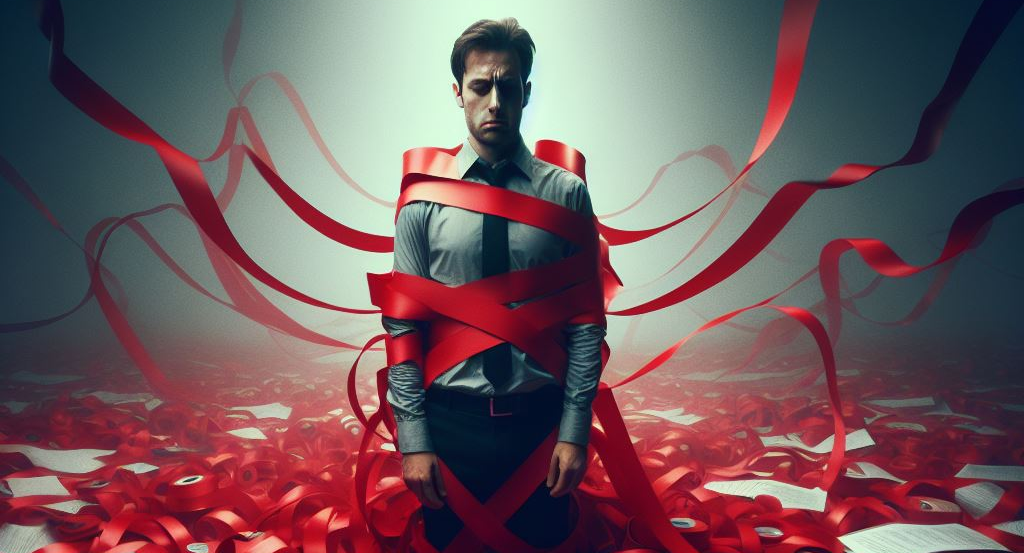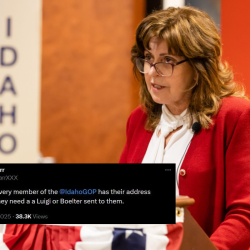In March of 1975, after retiring as governor of California but prior to his first presidential primary campaign, Ronald Reagan sat down with Johnny Carson to explain what he saw as the problem with government:
“The Office of Management and Budget in Washington, that’s responsible for the budget, for putting the budget together, cannot even tell you how many boards, commissions, agencies, bureaus, and departments there are in the federal government. But all of them can pass regulations, and those regulations have the force of law. The difference is, when you break the law, you’re innocent until proven guilty. When you break a regulation, the fellow charges you with breaking a regulation, you’re guilty. If you want to take him to court to prove your innocence, that’s up to you.
Just a few years later, the Supreme Court ruled in a cased called Chevron USA v. Natural Resources Defense Council that when adjudicated bureaucratic regulations, courts must defer to agencies’ interpretation of the law. Under President Reagan, the Environmental Protection Agency (EPA) had loosened certain regulations regarding factory pollution and was sued by an environmental group. The DC Circuit Court ruled against the EPA, saying it did not have the authority to change its own regulations contrary to the way the Court interpreted the 1963 Clean Air Act, which established the EPA.
The Chevron Corporation appealed the decision to the Supreme Court, which overturned the DC Circuit 6-0. Justice John Paul Stevens wrote that the DC Circuit was attempting to legislate from the bench in an area where Congress had been unclear. Ambiguities in federal law, Stevens argued, implicitly delegate rulemaking authority to the agency in question.
That decision appears correct in the short term. However, Chevron deference has been a disaster in the long term. Since 1984, courts have allowed agencies to broadly interpret the law, compounding Reagan’s complaint about government bureaucracies.
Several recent cases indicate that the current Supreme Court is on the verge of overturning Chevron. In 2022, the Court ruled in West Virginia v. EPA that the agency had overstepped its authority with regards to certain power plant regulations, and in last year’s Sackett v. EPA it ruled against the agency in a conflict with a small landowner. The Court heard arguments in Loper Bright Enterprises v. Raimondo earlier this year, and the decision in that case could undo Chevron entirely.
Why is this important? When people talk about the deep state, this is what they mean. Over the past century, unelected bureaucrats have accrued more and more power, to the point where today the permanent bureaucracy has much more de facto authority than Congress or even the president. Reining in that power is one of the most important political battles of our time.
Former solicitor general Theo Wold recently wrote an essay at the American Conservative explaining the history of the civil service and why it has become so difficult to dislodge from power:
The idea that 2.2 million unaccountable, unelected bureaucrats should decide for themselves how best to execute the laws is an affront to our Constitutional order and to the millions of Americans who are subjected to their anti-democratic bureaucratic tyranny.
The entire piece is well worth reading.

Here in Idaho we face the same problem that Reagan recognized in the federal government nearly half a century ago. Our state constitution authorized the creation of twenty departments, however the executive branch has used loopholes to expand the number of state agencies into the hundreds. Many of these agencies have rulemaking authority that can affect the way we live, work, and play in Idaho.
Speaker Mike Moyle and Rep. Vito Barbieri sponsored House Bill 626 last February and it passed both chambers in late March. This bill establishes that in any court case involving administrative rules to review them de novo, without regard for past case law or agency interpretation. When there is ambiguity, the law instructs courts to rule on the side of limiting agency power and maximizing individual liberty.
The House passed H626 on a party line vote while the Senate passed the bill 32-1-2 with only Democrat Sen. Ron Taylor voting against. In neither case was there any debate. Gov. Brad Little signed the bill into law on March 28, to take effect in July.
It’s unsurprising if you did not hear about this bill. It’s not as exciting or controversial as those that involve libraries, public money for gender transitions, or billion dollar budgets. But it is important. We can dream all day about eliminating agencies and shrinking the government back to something our Founding Fathers would have recognized, but we will not achieve that dream overnight.
Laws like H626 and Supreme Court decisions like Sackett v. EPA are how we start to fight back against the unaccountable administrative state. Eventually, however, we will need a president, a governor, or a legislature that is willing to think big. “The administrative state presents the single greatest crisis facing our county, a crisis of constitutional magnitude,” Wold wrote. H626 should be the first salvo against Idaho’s own deep state, not the last.
About Brian Almon
Brian Almon is the Editor of the Gem State Chronicle. He also serves as Chairman of the District 14 Republican Party and is a trustee of the Eagle Public Library Board. He lives with his wife and five children in Eagle.











